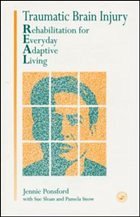Nicht lieferbar

Traumatic Brain Injury
Rehabilitation For Everyday Adaptive Living
Versandkostenfrei!
Nicht lieferbar
Weitere Ausgaben:
Table of contents:Mechanisms, Recovery and Sequelae of Traumatic Brain Injury - a Foundation for the REAL Approach. Assessing and Managing Impairment of Consciousness. Assessment of Cognitive Difficulties Following TBI. Managing Cognitive Problems. Assessing and Managing Changes in Communication and Interpersonal Skills Following TBI. Assessment and Management of Behaviour Problems. Returning to the Community. Dealing with the Impact of TBI on Psychological Adjustment and Relationships. Working with Families. TBI in Children.Practitioners who work with traumatically brain injured individuals a...
Table of contents:
Mechanisms, Recovery and Sequelae of Traumatic Brain Injury - a Foundation for the REAL Approach. Assessing and Managing Impairment of Consciousness. Assessment of Cognitive Difficulties Following TBI. Managing Cognitive Problems. Assessing and Managing Changes in Communication and Interpersonal Skills Following TBI. Assessment and Management of Behaviour Problems. Returning to the Community. Dealing with the Impact of TBI on Psychological Adjustment and Relationships. Working with Families. TBI in Children.
Practitioners who work with traumatically brain injured individuals and their families should find this book a useful resource. Based on scientific evidence and extensive clinical experience, it provides comprehensive and practical guidelines for the assessment and management of a wide range of problems associated with TBI. The book begins with a discussion of the epidemiology, pathophysiology and sequelae of TBI. It outlines the recommended approach to rehabilitation, termed the REAL (Rehabilitation for Everyday Adaptive Living) approach. The essence of this approach is effective teamwork, focusing on the real world, involvement of the injured person and family, and taking a long-term view of the rehabilitation process. The impact of TBI on families, carers and others close to the injured person is examined, and methods of minimizing family stress are outlined. The book finishes with a discussion of the special needs of children who sustain TBI.
Based on scientific evidence and extensive clinical experience, this book provides comprehensive and practical guidelines for the assessment and management of a wide range of problems associated with TBI.
Mechanisms, Recovery and Sequelae of Traumatic Brain Injury - a Foundation for the REAL Approach. Assessing and Managing Impairment of Consciousness. Assessment of Cognitive Difficulties Following TBI. Managing Cognitive Problems. Assessing and Managing Changes in Communication and Interpersonal Skills Following TBI. Assessment and Management of Behaviour Problems. Returning to the Community. Dealing with the Impact of TBI on Psychological Adjustment and Relationships. Working with Families. TBI in Children.
Practitioners who work with traumatically brain injured individuals and their families should find this book a useful resource. Based on scientific evidence and extensive clinical experience, it provides comprehensive and practical guidelines for the assessment and management of a wide range of problems associated with TBI. The book begins with a discussion of the epidemiology, pathophysiology and sequelae of TBI. It outlines the recommended approach to rehabilitation, termed the REAL (Rehabilitation for Everyday Adaptive Living) approach. The essence of this approach is effective teamwork, focusing on the real world, involvement of the injured person and family, and taking a long-term view of the rehabilitation process. The impact of TBI on families, carers and others close to the injured person is examined, and methods of minimizing family stress are outlined. The book finishes with a discussion of the special needs of children who sustain TBI.
Based on scientific evidence and extensive clinical experience, this book provides comprehensive and practical guidelines for the assessment and management of a wide range of problems associated with TBI.




